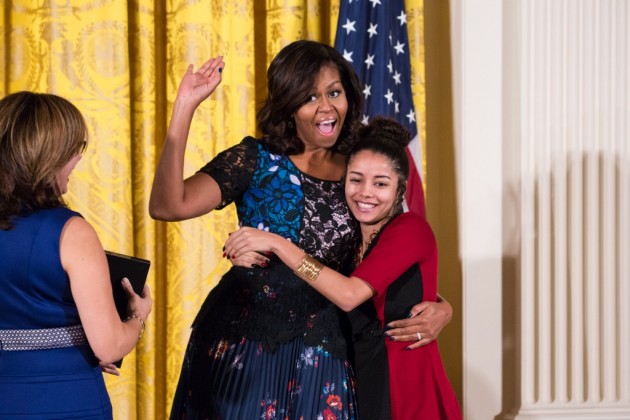WASHINGTON (NNPA) – Al Sharpton says Black leaders whofavored the losing effort of former Vermont Gov. Howard Dean overhis Democratic presidential campaign have nothing to show for theirmisplaced allegiance.
” Supposing they had gone with me, it would havestrengthened our hand,” Sharpton says. “They bet on a guy that lostoutright, which means they delivered us to nothing. They deliveredus to a pot of gold that wasn’t gold. I’m not bitter. I’mdisappointed.”
What had initially been an exciting 10-candidate primaryofficially ended last week when Kerry won the Illinois primary,pushing him past the 2,162 delegates needed to clinch thenomination at the Democratic National Convention in Boston inJuly.
Kerry had been endorsed initially by Reps. Danny K. Davis(Ill.), Donna Christian-Christensen (V.I.), William L. Clay, Jr.(Mo.), Harold E. Ford Jr. (Tenn.), Stephanie Tubbs Jones (Ohio),John Lewis (Ga.), Denise Majette (Ga.), Gregory Meeks (N.Y.), andJuanita Millender-McDonald (Calif.).Edolphus Towns (N.Y.) was theonly CBC member to endorse Sharpton.
Dean received the most CBC endorsements: Chairman ElijahCummings (Md.), Jesse Jackson Jr. (Ill.), Corrine Brown (Fla.),Carolyn Kilpatrick (Mich.), Sheila Jackson-Lee (Texas), Major Owens(N.Y.), Bobby Scott (Va.), Bennie Thompson (Miss.), and DianeWatson (Calif.).
“My criticism is that the Black leadership didn’t appear toconfront this election season with much of a sense of strategy andcertainly didn’t utilize leverage politics,” says Ronald Walters, apolitical science professor at the University of Maryland. “Andwe’re really all over the map.”
That’s an understatement.
Blacks weren’t just split between Kerry and Dean. Reps. SanfordD. Bishop (Ga.), William J. Jefferson (La.), Charles Rangel (N.Y.)and Bobby Rush (Ill.) endorsed retired Army Gen. Wesley Clark, apolitical novice.
Edwards was backed by Reps. Frank Ballance (N.C.), Chaka Fattah(Pa.), Eddie Bernice Johnson (Texas), Melvin Watt (N.C.) and AlbertWynn (Md.). Reps. Alcee Hastings and Kendrick Meek endorsed theirfellow Floridian, Sen. Bob Graham. Rep. James E. Clyburn (S.C.)endorsed Rep. Dick Gephardt (Mo.). Reps. Maxine Waters (Calif.),John Conyers (Mich.), Julia Carson (Ind.), Artur Davis (Ala.),Barbara Lee (Calif.), Eleanor Holmes Norton (D.C.), Donald Payne(N.J.) and David Scott (Ga.), opted not to endorse anyone.
“I hate to say it, but some people, in my judgment, cut offtheir own noses to spite their face,” Sharpton says. “They tried todilute me, but they’ve eliminated their own impact in thiselection. And I think that’s sad.”
CBC Chair Elijah Cummings does not regret supporting hispresidential choice.
“When I backed Dean, I said at that time I was trying to come upwith the candidate that I thought had the best chance of winning sothat before the election we can go to that person and get the kindsof commitments we needed to support our people,” he explains. “Ithink Al Sharpton played a major roll. He emboldened the othercandidates. I love Al Sharpton. I don’t know him but I love him,but now we’ve got to move forward from here.”
Sharpton, having won only 24 delegates, is determined tocontinue pushing a Black agenda after formally ending his run forpresident.
He met with Kerry recently to propose what he describes as an”urban agenda” as part of Kerry’s campaign platform. He says itincludes public education, affirmative action, racial disparitiesin economics and assuring that the Kerry campaign spendssignificant advertising dollars with Black-owned media.
Kerry, with 20 years in the U. S. Senate, is no stranger tourban issues. The last Congress, he got an A with 100 percent onthe NAACP legislative report card.
But, Sharpton contends doing well on an NAACP yardstick does nottranslate into a presidency with a solid agenda for Blacks.
“His NAACP record is how he voted when others raised an agendato him,” Sharpton says. “You can vote right. But if nobody raisesanything to you, you don’t vote at all.”
Sharpton says he is also planning a national summit in New YorkApril 29 through May 1 to outline an urban agenda. He says he willalso host town hall meetings around the country, leading up to theNov. 2 election.
These are steps Sharpton plan to take to leave a lastingpolitical infrastructure in place in the aftermath of hiscampaign.
However, similar pledges were made by Jesse Jackson Sr. afterhis 1984 and 1988 presidential campaigns and Minister LouisFarrakhan after his 1995 Million Man March. Some question whetherSharpton will be able do what Jackson and Farrakhan didn’t do.
“It can be done, but he has been proven not to be the one to doit,” Walters says, referring to Sharpton. “This is what the primaryelection season is for. It’s for testing. It is for testingparticularly whether or not you have a constituency and hownational is it, how deep is it, where is it. And he’s been provennot to have one or very much of a national constituency.”
Walters says it’s not too late for the CBC to make a major impacton the Democratic Party during this election.
“They ought to step up and exercise some leadership, which meansthat they ought to involve themselves in an agenda-building processand be seen to be doing that,” Walters says. “They ought to say,’We’re going to work with you. We’re going to fold whatever we dointo a mega agenda. And we’re going to roll that out during theCongressional Black Caucus weekend.”
Cummings contends the CBC, which met with Kerry only days after hesecured the nomination, will publicly advocate a strong Blackagenda for his campaign and administration.
“We are already steps ahead of what Ron’s talking about,”Cummings says. “We haven’t necessarily done it on paper yet, but wewill. Let me be real clear. We are going to hold his feet to thefire. We want to make sure that we have, not only output, but we’vegot to have input into policy. We’ve got to have input into theentire campaign, the convention, and appointments that comeafterwards. We want to make sure that African-American people gettheir due as a result of their performance. He cannot win withoutAfrican-American people.”
Perhaps Sharpton’s biggest embarrassment was the Feb. 3 SouthCarolina primary.
With 40 to 50 percent of the electorate Black, Edwards received37 percent of the Black vote; Kerry got 34 percent and Sharptonreceived just 17 percent, according to media exit polls. Put away,White candidates earned nearly 82 percent of the Black vote.
Sharpton says, “I’m glad we hung in there because had we not, Idon’t know if Black folks would even be discussing an agenda orvisibility at all at this convention. And that’s the sad thing. Ihope nobody ever has to go through in my own community what I’vehad to go through.”


